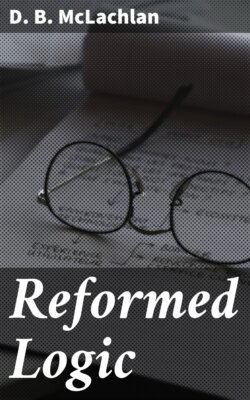Читать книгу Reformed Logic - D. B. Mclachlan - Страница 6
На сайте Литреса книга снята с продажи.
II—ONTOLOGICAL NOTIONS
ОглавлениеTable of Contents
Substantialism has two main divisions—Ontology, which treats of the mental substance in itself, and Logic or Metaphysic, which deals with its consciousness. The present essay is specially concerned with logic, but certain ontological premises must be assumed to render the logic intelligible. This follows from the subordinate relation of consciousness to substance.
The substantial mind consists of two principal parts—a SELF and a PLASMA—the Atman and Akaśa of Sanscrit philosophers.
Self is the seat of Energy and Consciousness. The plasma is inert and unconscious; it protects the Self and receives, communicates, and retains impressions of experience, both the external and the internal1.
The Self would be conscious though isolated from other minds, at least from those of its own grade of being. It would feel the fluctuations of its energy. But the experience called 'external' depends on the mutual action of minds. It is the form into which their consciousness is thrown when they come in contact. It lasts no longer than the contact, and so has only a casual existence.
The constitution of the mind is not given by Berkeley, and on other points also we must supplement and correct his philosophy. He was wrong as regards the mental cause of the perception of the Inorganic or Dead.
Since external experience implies that another mind is operating upon ours, what mind is operating when we perceive an object that is apparently mindless? Berkeley replies that it is the supreme mind that is then acting upon us.
Many objections can be urged against this view. I will mention only one, which seems to me conclusive. By every canon of judgment we possess, the living or organised is better—more important and significant—than the lifeless and elemental; so if Berkeley's reasoning be valid the phenomena excited by finite and created beings are superior to those excited by their Creator. The movements of a living man are referred to a human mind—a putrescent carcase is a vision immediately induced by the Deity.
The beauty of the starry sky is irrelevant to the question. Apart from the finite life and thought that may be associated with the stars, they have no more philosophical importance than a spadeful of sand.
A more reasonable account of the inorganic is found in several ancient philosophies. Gnostics and Neo-Platonists referred the elemental to a cosmic mind (Demiurgos) intermediate between human beings and the Supreme. The demiurgic mind is inconceivably greater and more powerful than the human, but is not necessarily better in quality. It is the origin of all natural forces, and its organic processes are what we term 'physical laws.' This is the explanation of inorganic consciousness which I feel disposed to adopt, but to discuss it fully would carry us too far from the subject of this work.
The next point relates to the body. What is its function in substantialism? The brain, says Berkeley, is an idea in the mind, and he ridicules the notion that one idea should generate all other ideas. This is an argument against materialism. No doubt he would have admitted, though he does not say so, that the body-idea facilitates, or at least must precede, the experience of other ideas. He would not have denied that it is an instrumental idea.
Since his time an important discovery has been made with reference to the constitution of the body. I allude to the Cell theory. It is no longer possible to regard the body either as a self-moving machine (if this is not a contradiction in terms), or as a lump of 'dead matter' animated by the mind. It is a society of minute animals2, each having a certain degree of independent energy and liberty of movement. They are organised and governed by the human or animal mind with which they are associated. In short, the relation of the cell to the man is analogous to, if not quite the same as, the relation of the man to the cosmic being.
This discovery complicates the problem of 'external' consciousness, without however affecting the principles on which a substantialist would endeavour to solve it. Instead of conceiving human minds as coming into immediate contact in perception, we have to conceive the cellular systems of each as forming a medium between the two. We do not perceive the other mind immediately or intuitively; what we perceive intuitively is certain affections in our own organism, which we must first refer to the other body, and then to the mind behind that body. Our knowledge of other human beings is thus altogether inferential.
The cellular medium explains why we are not generally aware of the substantial constitution of other minds; it is veiled by the intervening organisms.
The relation of body to mind, the reason of embodiment, and so forth, are questions of prime importance in ontology, but in logic we are concerned only with the object in consciousness, without reference to the apparatus of perception. The instrument of intellectual perception may in its proper character be ignored.
